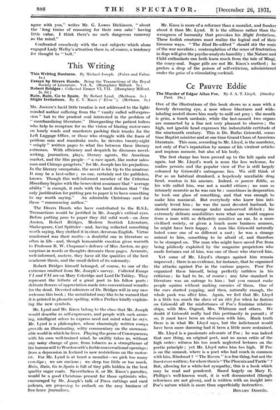Ce Pauvre Eddie
ONE of the illustrations of this book shows us a man with a fiercely devouring eye, a nose whose bluntness and wide- inhaling nostril shows him ready to sniff out prey ; the mouth is grim, a touch sardonic, while the last-named two organs are connected by a line not very pleasant to observe ; the high, not ignoble head expresses the indomitable certitude of the nineteenth century. This is Dr. Rufus Griswold, some-
time Baptist minister and at one time Grand Cham of American literature. This man, according to Mr. Lloyd, is the murderer, not only of Poe's reputation by means of his virulent articles and impious memoir, but also of his body.
The first charge has been proved up to the hilt again and again, but Mr. Lloyd's work is none the less welcome, for malice persists and the popular view of Poe is still largely coloured by Griswold's outrageous lies. We still think of Poe as an habitual drunkard, a hopelessly unreliable drug fiend, wanton in his amours. Indeed, ce pauvre Eddie, as his wife called him, was not a model citizen ; no man so intensely neurotic as he was can be : sometimes in desperation he took one glass of something, and that was enough to make him maniacal. But everybody who knew him inti- mately loved him ; he was the most devoted husband, he showed enormous courage under undeserved ill-luck ; his extremely delicate sensibilities were what one would suppose from a man with so delicately sensitive an ear. In a more civilized society, or given a touch more business acumen, he might have been happy. A man like Griswold naturally hated some one of so different a cast ; he was a strange animal to him, something to be afraid of, and therefore to be stamped on. The man who might have saved Poe from being pitilessly exploited by the magazine proprietors who made fortunes out of him, was one of those who starved him.
Yet some of Mr. Lloyd's charges against him remain unproved ; there is no evidence, for instance, that he organized the attacks against Poe in the various papers. Poor Poe organized these himself, being perfectly ruthless in his criticism ; he had to be, of course ; any false standard in literature was an outrage to him ; but you cannot make people squirm without making enemies of them. One of the curs started yapping, and then, naturally enough, the whole pack was after him. Again, we feel that Mr. Lloyd is a little too much the slave of an idee fixe when he fastens on Griswold all the misfortunes of Poe's feminine relation- ships, with Mrs. Osgood, Mrs. Whitman and others. We doubt if Griswold really had this pertinacity in pursuit ; if SO, it must have been an obsession with him. Much truth there is in what Mr. Lloyd says, but the indictment would have been more damning had it been a little more restrained.
Mr. Lloyd is a passionate advocate of Poe ; he was indeed that rare thing, an original poet, and no mean critic of the high order : witness his too much neglected lectures on the poetic principle ; yet Mr. Lloyd rates him too high. If Poe is on the summit, where is a poet who had much in common
with him, Rimbaud ? " The Raven " is a fine thing, but not the finest ever written ; for where then is "The Phoenix and Turtle " ? But, allowing for a white-hot sympathy, this is a book which may be read and pondered. Based largely on Mary E. Phillips's well-known work, it is well documented (though references arc not given), and is written with an insight into Poe's nature which is more than superficially instructive.
BONAMY DOBEffE.
































 Previous page
Previous page